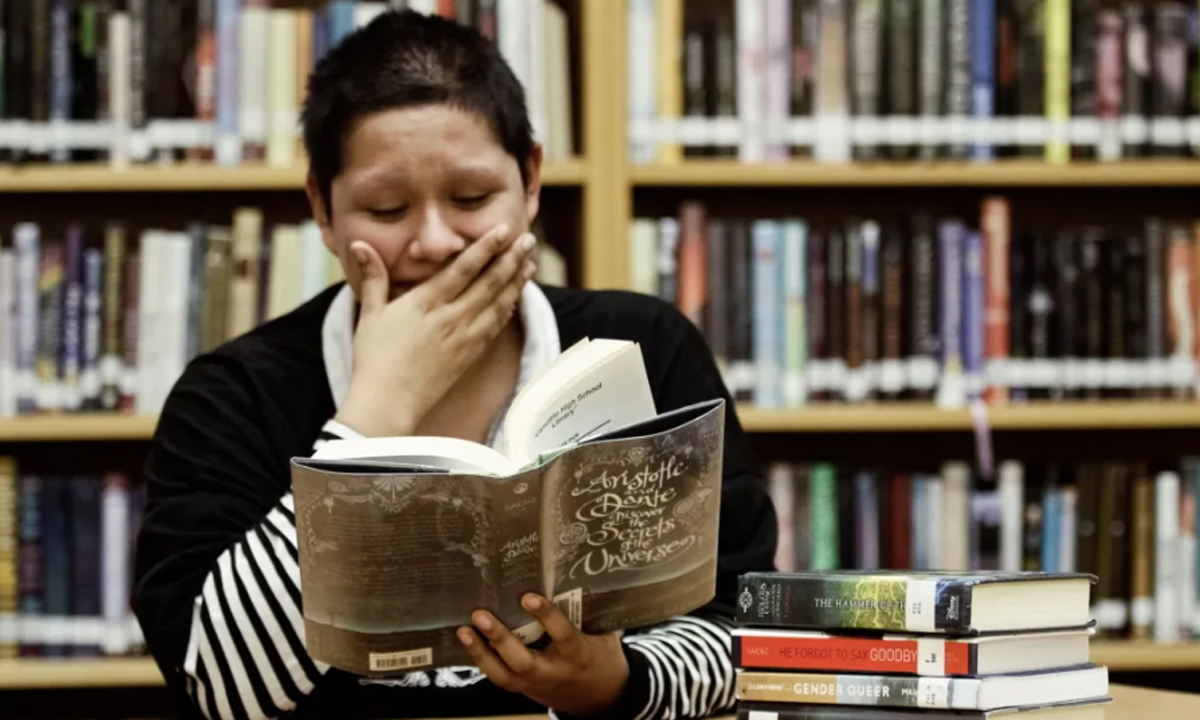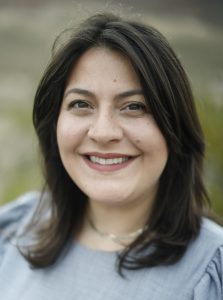Banned Books Exhibit at Texas Libraries Provide Access to Important Literature
The state is considering several bills that may ban books in schools that include content on sexual orientation, gender identity & sexual activity.

Get stories like these delivered straight to your inbox. Sign up for The 74 Newsletter
When El Paso teen Alex Reyes read “Magnus Chase” while in the seventh grade, they immediately identified with one of the main characters: Alex Fierro. It wasn’t just because of their shared first name, but because of their shared experience as gender fluid teenagers.
“It was the first time I had read a book where I saw something that I kind of felt similar to, related to,” Reyes said. “It’s stuck with me for so long. They have so much more going on, and the sexuality is just a part of it. … It’s not all that I am, but it’s a part of me.”
Rick Riordan’s “Magnus Chase” series, like many of the books Reyes reads, is being targeted by Texas legislators and school boards nationwide. A PEN America report from 2022 found that book bans affected 86 school districts across 26 states, with a combined 2 million students. More than 1,500 books have been banned already; Texas tops the list, with 16 districts having banned more than 700 books.
The number may soon rise further. The Texas Legislature is currently considering several bills that may ban books in schools that include content on sexual orientation, gender identity and sexual activity. Among the bills being considered are Senate Bill 13, House Bill 900 and House Bill 1804.
In El Paso, youth, authors, librarians and other community members are pushing back.
Last year, the city, in collaboration with the YWCA Paso del Norte Region, installed a banned books section at city library branches. “Books have been challenged and banned throughout history, and we are seeing a reemergence today,” the YWCA announced then. “Silencing and limiting of stories, histories, and points of view of anyone are direct attacks on the people who write and are represented in those books.”
The effort by El Paso Public Library sought to spotlight the stories of historically marginalized people and communities of Black, Hispanic, Indigenous, Asian and LGBTQ+ that are often left out of history books and school curriculums.
El Paso city Rep. Alexsandra Annello was elemental in championing the effort to bring access to banned books to area residents.

“A lot of teachers in the area were expressing their concern,” she said. “We really wanted to do it in solidarity with our school board partners … and say that the state can’t come in and tell us what not to have in our library. They’re being banned because they’re culturally informative.”
A city of El Paso resolution, created and passed unanimously by council in February 2022, declares that every public library in the city would have a banned books section, highlight the books year-round and form a partnership to accept the books from the YWCA.
The partnership between the two entities, Annello said, served as a message to the public that it wasn’t just a city initiative but a collaboration with community partners that is continuing and can be expanded.
“I was even expecting some of my fellow council members to fight against us, but we had overwhelming support,” she said, adding that the YWCA’s own inclusion and diversity committee donated the books. “The day after we passed this, people were showing up to the library (asking) to rent books.”
Having representation in literature
As Reyes continued their schooling, they found solace in stories they identified with. When a teacher shared the book “Aristotle and Dante Discover the Secrets of the Universe” by El Paso author Benjamin Alire Sáenz, it helped Reyes see that others in their community had some of the same questions.
“Seeing ‘Aristotle and Dante,’ something that takes place in my own hometown, written by someone from my hometown, someone who was a teacher at UTEP at one point, it made me realize that there are other people out there like me,” Reyes said. “I’m not alone and no one is alone.”
Having literature that reflected their own feelings helped Reyes finally feel like themselves – and discover what it meant to be gender fluid, allowing Reyes to come out to their family.
“I was so scared to say anything or even think about what I might be when I was little,” Reyes said. “I was so scared that everyone in my family was going to hate me because we were Christian.” But the books they had been reading, in which queer characters’ families and friends were not only religious, but supportive, offered Reyes hope.
“I was able to tell my mother (I was) gender-fluid. Having something concrete that I was able to say back to myself in the mirror gave me so much courage to be able to say it to her.”
School libraries
Armando Loera has been an educator for more than 30 years. Seventeen of those years have been as a librarian. Currently, he is the librarian coordinator for one of the school districts in El Paso County.
“As librarians and as educators, we are about having the freedom to teach real history,” said Loera, who spoke to El Paso Matters not as the representative of the district but as an expert on Texas school libraries. “The freedom to read what’s out there. We really are defenders of something we call the freedom to read.”
Due to proximity alone, school libraries offer daily access for school children to access literary materials without driving to a public library. If any of the current Texas legislation passes, new restrictions would be added on librarians’ ability to choose books, meaning students would have fewer books to check out.
“Since the beginning of time … people have had problems with knowledge, because knowledge really, truly is power,” Loera said. “The people that know are the ones that are in power, and they don’t want to share that power.”
When selecting which books will be at school libraries, librarians read reviews, look at education curriculums, and learn what books the students want, all while following guidelines set by the state.
“There are some parameters, but at the end of the day, they’re a little bit broad,” Loera said. “We don’t have the opportunity to read every single book that we have. We also read books, especially if they’re controversial, and then we make that decision.”
If House Bill 1804 were to pass, Loera believes the bill’s ambiguity could cause many books to be banned without being vetted adequately by librarians.
“Unfortunately, a lot (of the books) have to do with race (and sexuality),” he said. “They want to quiet, silence people of color’s experiences. They definitely want to do away with books that have to do with the LGBTQ experience.”
Close to half of the books that Texas wants to ban have to do with the LGBTQ experience, he says.
“Our communities are made up of a group of diverse people,” Loera said. “Books and libraries should be safe places for people to get books that they identify with and get information on things that they’re confused or curious about. By getting rid of those books, they’re not going to have that opportunity.”
The current attacks on books, Loera said, are highly political and a way to silence historical mistakes by those in power. He celebrates the decision by local libraries to make those books available.
“Many people feel that the more books are banned, the more attention you bring to those books, and those books get to be read even more,” he said. “The more displays we have like that, the more people will be aware and read those books.”
Loera believes the only people who should have a say in what children read are their parents, and not whatever political rhetoric is being used by those seeking votes.
“The problem comes when the legislature or political parties are wanting to make that decision for everyone,” he said. “As a parent, you’re welcome to go ahead and decide what your children can read, but it shouldn’t be extended to what others at the school should read.”
Fighting for books at school
Reyes and their classmates faced an attack on their freedom when a parent pushed to have the book, “Gender Queer: A Memoir,” removed from the Canutillo High School library. Reyes fought to have the school board reinstate the book.
“(The librarian) told me that the parent had called and threatened to burn the book inside the library,” said Reyes, who founded the Gender and Sexualities Alliance at their school. “(The parent) skipped going to the principal and just went straight to the school board. I went, and I gathered a whole bunch of people’s testimonies. Once I started advocating for this book and talking to the board … I got a lot of threats from parents and students in my school.”
Reyes took on the blowback, the insults and threats to be a voice for their community – seeking to emulate the efforts of their hero Adri Perez, an LGBTQ+ organizer and educator who was recently arrested at the Texas Capitol during a peaceful protest.
“I saw that (Adri Perez) were being called names and all these things, and I have been seeing this for years, but there are so many people still supporting them,” Reyes said. “No matter what happened, they still were a voice. But they still do it because if they don’t do it, no one else is going to do it.”
And so Reyes took on the battle.
“There are so many people out there who don’t have the voice that I have or are not in a safe place where they can talk about certain things,” they said. “I was in a position where I could do it.”
Rather than trying to indoctrinate or corrupt children, Reyes argues, these books are personal stories which authors share to connect with readers of different backgrounds.
“It is someone putting themselves out there, which lets other people know that they aren’t alone,” they said. “These authors and these people reading the books, we’re all one big community. No matter who comes out and says what about us, we know who we are, and we know what we’re trying to do, and we have to just keep fighting for what we’re trying to do.”
Possible sanctions for the city
The consequences for rebelling against the status quo can come in the form of state budget cuts for public libraries.
“The state of Texas can’t come into our facilities and tell us what we can and cannot have,” Annello said. “They’re saying they’re going to cut funding if we have these books. We’ve stood strong, and if it’s about finding other funding to keep our libraries going instead of silencing our community and silencing the stories, that’s something that we will do.”
The stories of minorities in the city are essential, according to Annello, who said El Paso will fight for racial and LGBTQ+ tales to continue to be available for those that want representation in the shelves of their libraries and the halls of powers.
“(Those stories) shaped this country and will continue to shape this country and are extremely important stories not only for the people of El Paso but across the country,” she said. Bills like these, Annello said, are used to silence these stories and voices.
“It is important for communities like El Paso and across Texas to stand up against them.”
This story was co-published with Next City as part of our joint Equitable Cities Reporting Fellowship For Borderland Narratives.
This article first appeared on El Paso Matters and is republished here under a Creative Commons license.![]()
Get stories like these delivered straight to your inbox. Sign up for The 74 Newsletter

;)